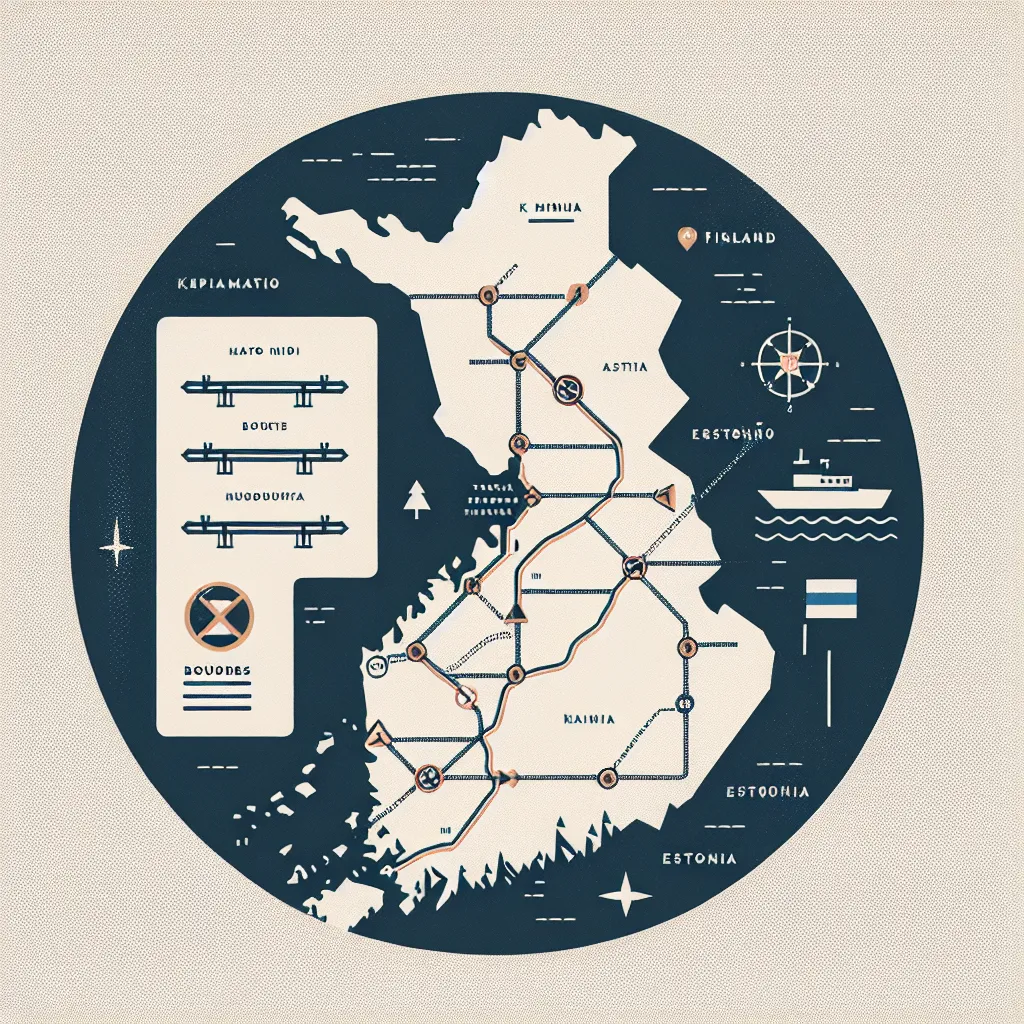Entry regulations for Finland: what you need to know in the context of COVID-19?

- Current border crossing rules during the COVID-19 pandemic
- Who can cross the border into Finland under current conditions?
- What are the entry rules for Estonia for different categories of citizens?
- Who is exempt from self-isolation upon arrival in Estonia?
In Belarus, the Ministry of Foreign Affairs has prepared and published information on the rules for crossing borders of different countries in the context of the COVID-19 pandemic. This information is current as of June 30, 2021. In this context, it is worth highlighting the online resource "Re-open EU," which serves as a source of information on the current entry rules for countries in the European Union, allowing non-EU residents to find out the necessary conditions for entering specific states.
The situation with Finland
As for the situation with Finland, the internal border measures between it and Iceland, as well as Malta, have been eased — the restrictions have been lifted. However, when it comes to external borders, the restrictions do not apply to the Vatican. Citizens of Australia, Israel, New Zealand, Rwanda, Singapore, and South Korea are only allowed direct flights without transfers.
Internal and external constraints
Despite the lifting of some restrictions, internal border controls continue to be in place between Finland and countries such as:
- Austria
- Belgium
- Hungary
- Germany
- Greece
- Denmark
- Spain
- Italy
- Latvia
- Lithuania
- Liechtenstein
- Luxembourg
- Netherlands
- Norway
- Poland
- Portugal
- Slovakia
- Slovenia
- France
- Czech Republic
- Switzerland
- Sweden
- Estonia
It should be noted that this does not affect the movement of cruise ships.
Cross-border external movement
As for external border traffic from countries such as Andorra, Bulgaria, Ireland, Croatia, Romania, San Marino, Cyprus, and Monaco, it is allowed under the same conditions as for internal borders. For third-country nationals, including Belarus, the possibility of external entry is available, but only in certain cases.
Return to Finland
When it comes to returning to Finland, there are several categories of citizens who are allowed to do so:
- Finnish citizens and their family members
- Individuals who are in Finland but are citizens of EU countries or Schengen Agreement participants.
- foreigners with permanent residence in Finland
- Citizens of the United Kingdom and their families who fall under the terms of the UK's withdrawal agreement from the EU
Return to other EU countries
As for returning to other European Union countries or transiting through these states, similar conditions apply to citizens of other EU countries and their family members. This also applies to residents of third countries who have obtained a residence permit in one of the EU or Schengen zone countries. British citizens and their families in Finland must follow the established rules outlined in the exit agreement.
Introduction
In recent years, the issue of crossing the Finnish border for certain categories of citizens has become particularly discussed, especially against the backdrop of global changes brought about by the pandemic and shifts in international relations. The main reasons for crossing the Finnish border are related to work that is of significant importance to society.
Key categories of individuals
This concerns activities that are critically important for maintaining the supply of goods and services, which can only be performed by qualified specialists arriving from other countries. It is essential to emphasize that such work cannot be postponed or delayed.
- Medical workers and rescuers providing first aid.
- Specialists in elderly care.
- Employees of transport and logistics companies.
Rights and privileges
Diplomats, employees of international organizations, military personnel, and representatives of humanitarian services also have the right to enter Finland for the purpose of carrying out their official duties. Such privileges are also granted to representatives of countries participating in international negotiations, as well as to staff from various non-governmental organizations.
Persons with the right to cross the border
Individuals with a Finnish residence permit, as well as those receiving international protection or having humanitarian reasons for travel, can also cross the border. Additionally, trips for urgent family circumstances are permitted, such as:
- Birth of children.
- Serious illnesses of loved ones.
- Weddings or other significant personal events.
Transit needs
Sometimes trips related to transportation issues can be deemed necessary and justified, which also applies to representatives of foreign media interested in events taking place in Finland. Regular transit flights are also permitted at airports for those who are in transit, as well as for the family members of Finnish citizens living abroad.
External flows and rules
As for the flows from third countries at the border, they are only permitted for certain categories, such as cultural and sports workers, as well as businesspeople. Similarly, holders of diplomatic and service passports can travel for official purposes without any restrictions.
Entry requirements
It is important to note that having a negative coronavirus test, a document proving recovery from the illness in the last six months, or a vaccination certificate are not sufficient grounds for crossing the Finnish border. These documents may only influence the security measures taken regarding individuals crossing the border into Finland.
Responsibility for safety
Finnish health authorities take into account all certificates related to COVID-19 tests, as well as vaccination documents required for border safety compliance. The responsibility for monitoring the implementation of all required measures lies with the Finnish Institute for Health and Welfare (THL), which oversees the safety of individuals arriving in the country and provides recommendations on various epidemiological measures, including the possibility of self-isolation after crossing the border.

All the necessary information is available on the official websites of the Finnish government and the border authorities of the country.
29 September
9 October 2024
9 October 2024


Classification of citizens for entry into Estonia
- Citizens of Estoniaas well as individuals who hold a residence permit or have the right to obtain one in this country. This category also includes those who are registered with the Estonian population registry, regardless of the presence of any disease symptoms;
- Foreigners...arriving from non-EU countries, including Belarus. These citizens come for work or study purposes and should not show any signs of illness;
- Individuals with long-term visasissued by European countries, countries of the European Economic Area, Switzerland, the United Kingdom, as well as microstates such as Andorra, Monaco, San Marino, and the Vatican. Their families can also visit Estonia if they do not show any symptoms of illness;
- All the other touristsarriving from European countries or the Schengen area, including the United Kingdom, and who do not show any obvious signs of illness.
Procedure for filling out the questionnaire
Before heading to Estonia, it is necessary to fill out a special form intended for border crossers. This form should be completed no later than three days before the entry date.
Self-isolation mode
If your route passes through a country with a high risk of infection, you will need to observe a self-isolation regime for 10 days. The obligations to comply with the self-isolation regime also apply to those who show symptoms of the disease.
Regarding citizens arriving in Estonia from European countries or other regions, there are certain exceptions concerning the mandatory 10-day self-isolation and COVID-19 testing. These exceptions apply to various categories of people.
Categories of individuals exempt from self-isolation
- Diplomatsand employees of foreign embassies and Estonia, as well as their family members.
- People who were previouslyhad COVID-19and were declared healthy less than six months ago.
- Citizens who have completed the full coursevaccinationsagainst COVID-19, if no more than one year has passed since the last dose was received.
- Participants of the internationalmilitary cooperation.
- Representatives of foreign delegations who are in the country at the invitation of government institutions or local authorities to carry out official tasks.
- Employees engaged incargo transportationand materials, including those who are loading them, and those arriving to fulfill their work duties.
- Workers in the medical field and specialists providing services inemergency situations.
- Workers involved in international cargo and passenger transportation, as well as crew members serving theminternational transport vehicles.
- Individuals engaged inmaintenanceand the repair of such vehicles.
- Representatives providing services forpassengersand working with tourist groups.
- People whose arrival is necessary for ensuring stable operation.critical services.
- Those who use Estonia astransit point.
Conditions for arrivals from the EU and other countries
For those who have arrived from countries in the European Union, the European Economic Area, the Schengen Zone, or the United Kingdom, there are certain conditions regarding the 10-day movement restriction.
These restrictions are imposed on individuals arriving from regions where the infection rate exceeds 150 cases per 100,000 people over the past two weeks. For example, from June 7 to June 13, this restriction will apply to citizens returning from countries such as Andorra, Belgium, Greece, the Netherlands, Denmark, Cyprus, Latvia, Lithuania, Slovenia, and Sweden.
The procedure for those returning from safe countries
However, for those returning from countries with a virus spread level below 150 cases per 100,000 population over the last two weeks, such restrictions will not apply. This creates opportunities for freer movement without unnecessary obstacles and bureaucratic interactions.
The significance of current information
It is important to remember that the relevance of these requirements and the existence of exceptions depend on the current situation regarding the spread of the virus. Special attention should be paid to these aspects to avoid any misunderstandings when planning trips. Stay alert to updates and regulatory measures to ensure that your trip goes as smoothly and safely as possible.
Conclusion
In conclusion to this review of the entry and exit regulations for Finland and other European Union countries in connection with the COVID-19 pandemic, I want to emphasize that this topic remains extremely relevant and important for many citizens, especially those who are planning their trip or return to Finland.
As can be seen from the information provided, entry restrictions and rules are constantly changing depending on the epidemiological situation both in Finland and in other countries. The coronavirus pandemic has posed many challenges, and issues related to international travel have become particularly pressing.
Use of an online service
I have realized that even when some restrictions are lifted, it is important to stay vigilant and keep an eye on the latest information. The online service "Re-open EU" has become an indispensable tool for obtaining up-to-date information on entry rules, and I recommend everyone to use it.
Safety measures
Finland, like other EU countries, implements specific security measures, and it is important to understand that having negative test results, proof of vaccination, or recovery from illness does not always automatically grant the right to enter. These documents may only be considered as additional security measures, and each entry decision is made by the local health authority.
Key points:
- Situations can change.The entry rules for foreign citizens are becoming increasingly complicated.
- Necessary preparation:It's important to carefully gather all the necessary documents before traveling.
- Keep track of current data:It is recommended to stay in touch with official sources of information.
Conclusion
In conclusion, I recommend that everyone interested in this issue stay updated with current news and official sources of information to avoid misunderstandings and to ensure maximum protection of their rights. The pandemic requires us to be more flexible and understanding, and I believe that over time the situation will improve, allowing us to explore new horizons and travel safely.
Comment
Popular Posts
29 September
374
9 October 2024
1485
9 October 2024
9939
Popular Offers

Subscribe to the newsletter from Hatamatata.com!
Subscribe to the newsletter from Hatamatata.com!
I agree to the processing of personal data and confidentiality rules of Hatamatata












